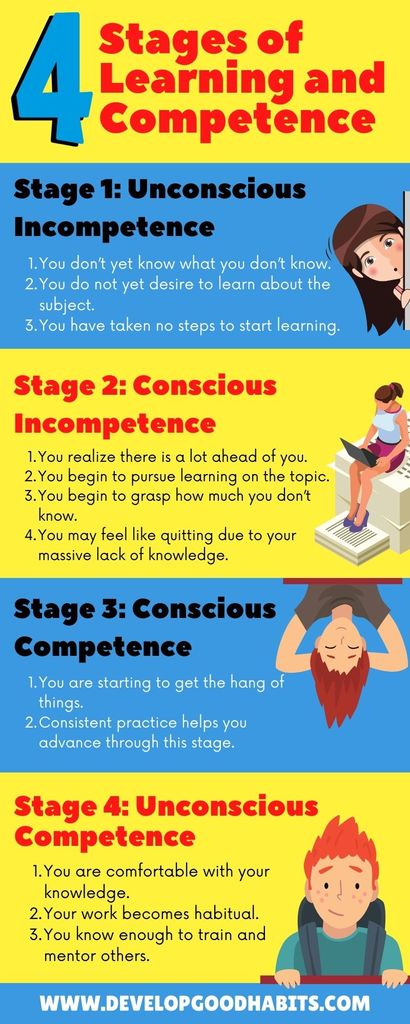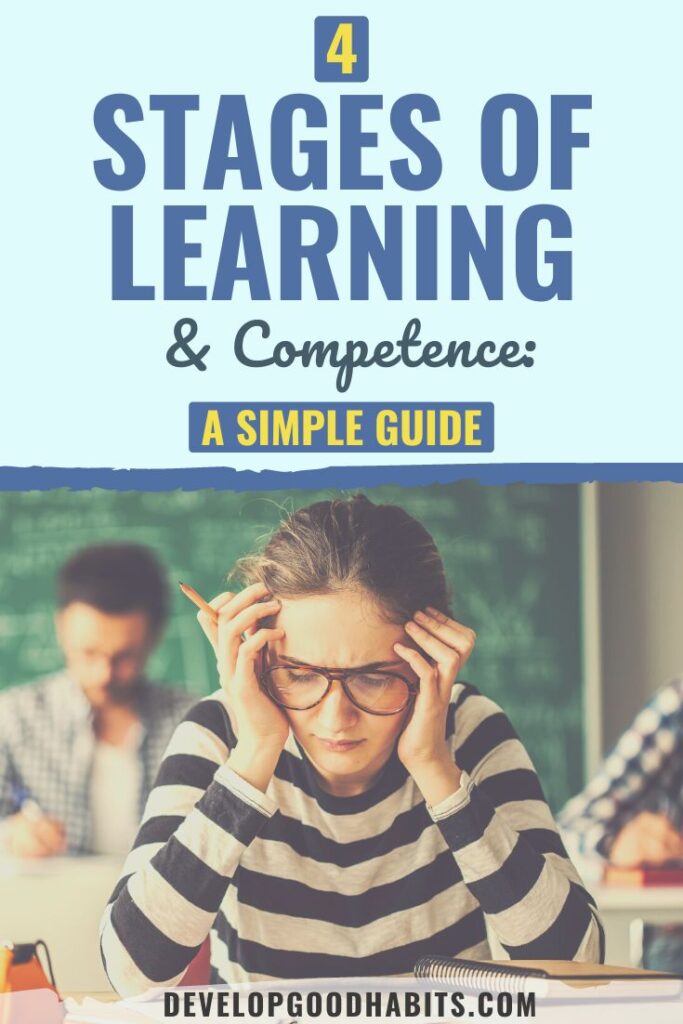There might be affiliate links on this page, which means we get a small commission of anything you buy. As an Amazon Associate we earn from qualifying purchases. Please do your own research before making any online purchase.
Have you ever felt completely helpless when you were trying to learn something new? Have you come close to giving up because you thought you would never understand it, and feelings of inadequacy start to plague you?
Maybe you were trying to learn something simple like the rules of an unfamiliar board game–or maybe it was more complex, like learning a new language.
Either way, we all experience moments when learning something new that we question our dedication to the process because it seems overwhelming.
We all have different styles of learning, but one thing we all have in common is the stages that we go through when learning something new.
There are four stages of progression that we all work through when a need presents itself to learn something new. Being aware of the four stages of learning and competence can help you power through those tough times when you want to give up.
Each stage of learning relates to the emotional state associated with the process of growing from being incompetent in something to gaining competency.

The four stages posit that at first, people don’t know how little they know, meaning they are unconscious of their incompetence. As people begin to realize the deficit in their knowledge, they consciously seek to acquire a skill or new knowledge to then be able to consciously apply it.
Eventually, the skill can be practiced without having to carefully think it through, which means you are unconsciously competent.
In this article, I am going to talk about the four stages of learning and walk you through an example of what this progression might look like in your life. Then I am going to share with you how you can use these four stages of learning to develop your skills and talents.
I’ll start by setting the stage for the example that I will present in this article that I think most people will be able to relate to. Think about a time that you started a new job–whether it was your first job busing tables at a restaurant or a job you landed once you were well into an established career.
Keep that in mind as we go through these stages so you can recognize that you’ve already experienced these stages of learning in your life and worked your way through them.
Stage 1: Unconscious Incompetence
This is the stage in which you don’t yet know what it is that you don’t know. You just got your job offer and you’re excited to start working, but you have no idea what systems, processes, and rules you’re going to have to learn once you start.
You don’t know the degree of your incompetence, and you don’t yet feel the need to learn the company’s operating system because you’re not doing the job yet. Ignorance is bliss.
The amount of time that you spend in this stage depends on how strong the initial stimulus is for you to learn. Until you recognize the value of the skill at hand and make that next step to wanting to learn it, you will not move past this stage.
There are many potential skills or lessons in life that you will face in which you will not pass this stage. But that is certainly alright, because you can’t learn everything that there is to learn.
Learning something needs to add some type of value to your life or else you’re not going to want to put the brain power into the process. There has to be a goal or an intended outcome in mind in order to get past stage one.
In the example of starting a new job, the goal is to learn the job in order to be successful in it moving forward.
Stage 2: Conscious Incompetence
Once you get to stage two, you realize there is a lot ahead of you. You’re in your first day of training, watching an experienced employee whiz through a computer program and you’re thinking to yourself, “I’m never going to get this.”
The excitement you felt at the end of stage one is starting to melt away as you’re feeling inadequate compared to the people around you.
It is during this stage when your level of commitment is critical. Do you have the dedication to follow through with learning the task?
This is the stage in which we often want to quit because no one likes to feel weak as they face a deficit in knowledge. However, this is also the stage where you can see the full value of pushing forward to close that knowledge gap.
Sidenote: If you want to learn quickly, then the key to mastering a new skill is to only focus on the information that can be immediately applied. Using the “just in time” learning technique can help you master any skill in a short amount of time.
Stage 3: Conscious Competence
At this point, you’ve been patient and you’re starting to get the hang of things. Maybe you’re mostly doing your job on your own, but you’re still talking to your supervisor several times to day to gain clarity on some aspects of the job or to help fix a mistake that you made.
You work slowly throughout the day, paying close attention to your next step as you recall what you learned during your training and now you’re applying it to the job.
You know which button to press next on the computer system, but it takes you a bit of time to find it. During this stage, you’re practicing consistently and noticing your improvement.
Any mistakes you make are a major component to your learning at this stage, because you will have to actively go back and undo them, which means you’re less likely to make the same mistake in the future.
Stage 4: Unconscious Competence
At this point, you’re so comfortable in your new job that you run through the day on auto-pilot. You don’t have to put too much effort or focus into figuring out what comes next because your job has become habitual.
You can even do two things at once because you no longer need to pay close attention to your computer screen–you can be talking on the phone and going through the motions at the same time.
You may look at a new employee walking in the door and feel empathy for them, as you were once in their shoes, but you know that they will eventually be able to get to where you are and breeze through their days at work as well.
You may even be a part of their journey as you’re now equipped to teach someone the skills that you have gained.
How to Use This Information to Develop Skills and Talents
It should come as no surprise that you have to gain skills in a variety of positive behaviors to achieve personal development. Every skill that you develop requires awareness of a gap in knowledge, learning, the application of what you’ve learned, and continued practice.
One thing that is important to notice throughout these stages is how your emotional state will change as you progress. You will go from feeling excited to feeling unsure about yourself, and finally to a progressive feeling of confidence.
Being aware of the light at the end of this emotional tunnel can help you power through those times in which you feel insecure because you know stages three and four are ahead of you. It is critical to recognize the time and patience it takes to get to the fourth stage if you don’t want to be tempted to quit.
Knowing what stage of learning you are in also lets you find the relevant coaching and internalize new information in such a way that will help you move on to the next stage of developing your skills.
For example, if you are in stage two, you may want to consult someone who is well-versed in the skill or talent so you can be coached by someone who was once in your shoes.
These are the people who know the process of learning whatever particular skill you’re working on the best and can therefore give you the relevant coaching that you need.
Understanding that the process of learning takes place in stages also help you be more patient when you’re developing a new skill and remind you that things don’t happen overnight.
Instead, you can pay attention to the process of learning and not allow your emotions that are associated with a certain stage stand in the way of your progression onto the next stage.
Even moreso, being aware of the stages of learning can help increase your sense of intrinsic motivation to not give up, as you’re learning to enjoy the process of learning without rushing to get to the end result.
You’re able to pay attention to where you are in the four stages right now without worrying about how long it is going to take you to get to the next stage.
The process is personally rewarding as you see yourself make progress toward learning something new, which makes you want to keep learning more.
Final Thoughts on the Four Stages of Learning
The next time you find yourself frustrated because you’re trying to pick up on a new skill or talent and you’re not quite getting it, think about the four stages of learning and the importance of not rushing the process. Recognize the stage that you are in and accept the emotions that go along with it.
Doing this will reduce your chances of giving up on your ultimate goal of gaining a new skill because you will have learned how to be patient with yourself as you learn from your mistakes and make progress in acquiring new knowledge.
If you’d like a simple guide on how to take any new skill and go from unconscious incompetence to unconscious competence, then I recommend checking out Novice to Expert, which is a step-by-step guide on how to master new skills.
Now, if you're looking for more resources to help you learn new skills or subjects, then the following articles might help:
- 10,000-Hour Rule: A Simple Rule for Mastering a Skill
- How to Learn Anything Faster with the Feynman Technique
- 20 Simple Ways to Self-Educate
Finally, if you want to take your goal-setting efforts to the next level, check out this FREE printable worksheet and a step-by-step process that will help you set effective SMART goals.

Connie Mathers is a professional editor and freelance writer. She holds a Bachelor's Degree in Marketing and a Master’s Degree in Social Work. When she is not writing, Connie is either spending time with her daughter and two dogs, running, or working at her full-time job as a social worker in Richmond, VA.



